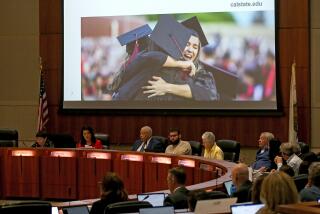19% of female University of Oregon students cite sex attacks, survey says
Nearly 1 in 5 female students at the University of Oregon have been raped or experienced an attempted rape while attending the school, according to a new study, but few said they reported sexual attacks to the authorities.
The data come from an online survey of almost 1,000 students administered by a psychology professor and two graduate students at the university, where preliminary findings were released this week.
The study has not been peer-reviewed, and its sample could be weighted toward those who have been assaulted if they are more likely to want to participate in a survey. There could also be other issues that might skew the results.
But the survey’s findings -- including that 90% of those who say they were victimized did not report unwanted sexual contact to school officials -- have alarmed university leadership.
“These survey results shine a light on a terrible, unacceptable problem. It shows us we have a lot of work to do,” interim university President Scott Coltrane said in a statement provided to the Los Angeles Times.
The study comes during increased national scrutiny over universities’ role in responding to sexual assaults, which often go unreported for a variety of reasons.
The University of Oregon, in Eugene, is among several universities that have come under fire for handling of sexual assault cases -- especially after three Oregon basketball players were kicked off the team in May, two months after being accused of raping a female student. (They were not criminally charged.)
The university Senate -- which is composed of faculty and other staff members, students and administrators -- convened a task force to study the university’s responses to sexual assault allegations. The panel is expected to present its findings at an Oct. 22 meeting.
The survey’s findings stood in contrast with university crime statistics released this week under the Clery Act, which counted 23 total sexual assaults in 2013 on and off campus. The University of Oregon reported having 24,548 undergraduate and graduate students enrolled in the fall of 2013.
According to the new study, 10% of female students surveyed said they had experienced unwanted vaginal or anal penetration during their time in college. When expanded to include unsuccessful attempts of rape, 19% of the female students said they had been attacked.
When further expanded to include unwanted groping or oral sex, 35% of surveyed female students and 14% of male students reported being assaulted.
Seventy-three percent of students reported knowing their attacker, and 58% of attacks happened in a private residence rather than in a dorm (17%) or in a fraternity (10%), the results showed.
“It’s important to know the majority of the victims are saying they knew their perpetrator – these are not stranger events,” said Jennifer Freyd, a professor of psychology at the university who administered the study. “Our societal understanding [of rape] is someone jumping out of the bushes, but that’s not the biggest risk for college students.”
The survey said 86% of rape survivors surveyed did not tell any university source about what had happened. But that’s only part of the problem with the university’s response, investigation and punishment process, Freyd said in an interview with The Times on Thursday.
“It’s very clear there’s a lot of dead ends” in the reporting process, she said. “A student makes a report, and maybe that report is supposed to get passed forward, and it doesn’t. … We don’t know what happens.”
Freyd said that in one study she’d done with university employees, “we had quite a substantial group of employees saying they did receive a report, but they didn’t pass it on, perhaps because they’re as confused as the students.”
“Underreporting of sexual assault is a widespread problem that needs immediate attention,” Coltrane, the interim president, said in a separate statement addressing the release of campus crime statistics. “The university has a responsibility to keep students safe, and we must do anything we can to create an environment where they are comfortable coming forward with reports of incidents.”
The study was funded through the University of Oregon Center for the Study of Women in Society and from private donations made through the University of Oregon Foundation.
Respondents were selected randomly from a pool of degree-seeking undergraduate students and offered a $20 Amazon gift certificate for participation. Researchers hoped to get 1,000 responses; they received 982 completed questionnaires and 76 partially completed ones. Their target population was 53% women, but respondents were 66% female. Respondents also were more likely to be white than the target population.
Freyd said more findings were expected as researchers continued to sift through the data.
Follow @MattDPearce for national news
More to Read
Start your day right
Sign up for Essential California for news, features and recommendations from the L.A. Times and beyond in your inbox six days a week.
You may occasionally receive promotional content from the Los Angeles Times.







